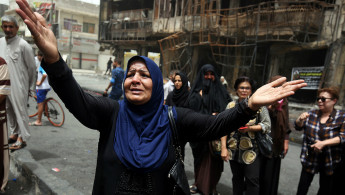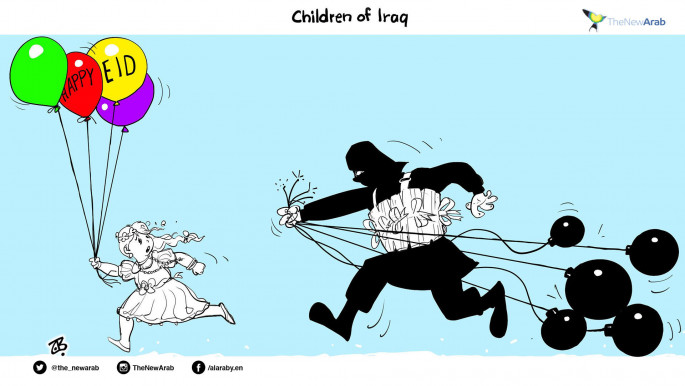Iraq's deadly Ramadan paves way for Eid mourning
Hundreds of Iraqi civilians, ecstatic to reach the end of the Muslim holy month of Ramadan, had taken to the streets to shop for new clothes to wear during the upcoming Eid celebrations this week.
But the joy shared among the men and women of all ages –including children – during Ramadan was short-lived, soon to be mutated into helplessness and hopelessness, as utter carnage ripped through the popular shopping street.
The large explosion set several buildings ablaze, completely destroying the once-bustling shopping centre in the heart of the capital.
Although the deadliest, Saturday's attack was just one of several that rocked the country during what is supposed to be a peaceful time for millions of Muslims observing Ramadan across the globe.
In June alone, 662 Iraqis – half of whom were civilians –were killed while 1,457 more were injured in acts of terrorism, violence and conflict, figures from the United Nations Assistance Mission for Iraq [UNAMI] suggest.
As Muslims across the country began their month of worship on June 6, the self-branded Islamic State group continued plotting against Iraq's government forces, infrastructure, economy and did not hesitate in attacking its civilian population either.
"We had hoped for a period of calm during holy Ramadan, a month of peace and compassion, but unfortunately the violence continued to take its toll on civilians," said Ján Kubiš, the Special Representative at UNAMI.
 |
The terrorists did not spare an occasion to strike at markets, mosques and areas where people gathered in order to exact maximum casualties among civilians - Ján Kubiš, UNAMI |
 |
Compassion was nowhere to be seen when a suicide bomber waltzed into a mosque full of worshippers during evening prayers, only to detonate explosives and kill nine Muslims – raising bloody Baghdad’s death toll to 236.
Peace was absent in Ninewa where 56 lives were taken by militants; in Salahuddin where 24 were slain; Kirkuk where 20 were killed; Diyala where 21 were butchered and in Karbala where 8 were executed – all during the month of Ramadan.
"The terrorists did not spare an occasion to strike at markets, mosques and areas where people gathered in order to exact maximum casualties among civilians, despite the religious occasion and in total disregard of the values of Islam," Kubiš poignantly explained.
Large crowds have since gathered at the scene of Saturday’s attack – described as the most deadly in the Islamic State’s short, but bloody history – as smoke from surrounding buildings continued to linger in the air.
"The lists of victims I saw included whole families, the father and his sons, the mother and her daughters – whole families were wiped out by this explosion," a member of the civil defence forces said as frantic relatives searched for their missing loved ones.
Charred buildings lined the street as names of the victims proudly fluttered on raised black flags.
At night, weeping crowds, both helpless and yet defiant light candles in remembrance of the martyrs – many of which were young men in their twenties.
"With our souls, with our blood, we sacrifice for you, O' Iraq," they chant during funeral processions for Iraqis that were destined to wear white shrouds this Eid.
 |
'With our souls, with our blood, we sacrifice for you, O' Iraq,' they chant during funeral processions for Iraqis that were destined to wear white shrouds this Eid |  |




